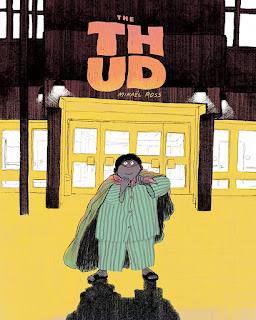Americans are likely to jump into some kind of superhero explanation, either real in the world of the story or imagined by the protagonist - to assume, first of all, that this young man is "The Thud," and the story is about his adventures, in whatever mode.
The Thud is not a person. The Thud is an event. It's a moment, one that led this young man - his name is Noel - to stand outside that hospital, clutching that blanket.
I've had Thuds in my life: moments where everything changes. If you're old enough, you have, too. The point of a Thud is that it's unexpected, and that it's usually not happy. Something breaks, something shatters, something is gone forever.
Noel Flohr lives in Berlin with his mother as The Thud opens. He's twentyish, but clearly has some kind of developmental disability: he's loud, and not good at social interaction, and seems to be obsessed with a few things. We don't know his diagnosis. But we know he needs help, that he needs support to make it through life. And his mother is that help and support: it's just the two of them against the world, and that's fine with them.
Thud.
One night, Noel heard a noise. He finds his mother lying on the floor, a pool of blood by her head. He knows enough to call the emergency services. He saves her life, probably.
But she's had a stroke. She's in a medically induced coma. It is no longer the two of them against the world.
Noel is put in the care of a guardian, who he thinks of as "the man with the 'stache." He's sent to live in a group home in the village of Neuerkerode, which seems to be largely populated by the developmentally disabled and their minders.
The bulk of the story happens from that point: how Noel settles into Neuerkerode, the people he meets there, his new way of living. It's told in episodes, moments in Noel's new life. There's Valentin, another young man in the same home, who becomes something like his new best friend. There's a woman he is attracted to, and another woman who may be attracted to him. All of them are disabled in some way, all of them have some kind of trouble interfacing with the "normal" world, something that led to them living in Neuerkerode.
So I have a warning for readers of The Thud. We often expect a story to have a certain shape, to be about people who grow and change, who encounter new things and become better people, who fall in love and build lives with others.
Noel, and most of the other characters in The Thud, aren't capable of that kind of easy growth, certainly not in any short period of time. They are not going to "get better." They are not going to "learn to be normal." They are not going to "get over it." This is who they are; these are the lives they have to lead.
What they can do - what they do do - is to live those lives, as best they can, within the guardrails those neurotypical guardians make for them. (And some readers may find there's a lot of leeway in what the inhabitants of Neuerkerode are allowed!) They may act out, they may be inappropriate, they may try to do things for reasons that seem weird or wrong from a neurotypical point of view. But they're living their lives, as best they can.
That's what The Thud is about: how Noel lives when the way he lives is completely upended. It's based on true stories: Neuerkerode is a real place, though I think Noel is completely fictional. Mikael Ross visited it several times while working on this graphic novel: this isn't an "official" publication of that institution, but it's close.
The Thud is meant for younger readers: people a few years younger than Noel, probably in their teens. Maybe neurotypical, maybe not. Maybe German, maybe American, maybe from other places. I suspect a lot of those younger readers will get more out of The Thud than their parents will; I've already seen a few wrong-headed reviews by American adults, too focused on their own guardrails and expectations.
If you're not too rigid in your own guardrails, you should read it. If there's someone not neurotypical in your life - yourself, a child, a friend, a spouse, whoever - you should read it. If you wonder what would happen to your life after a Thud...read it.

No comments:
Post a Comment